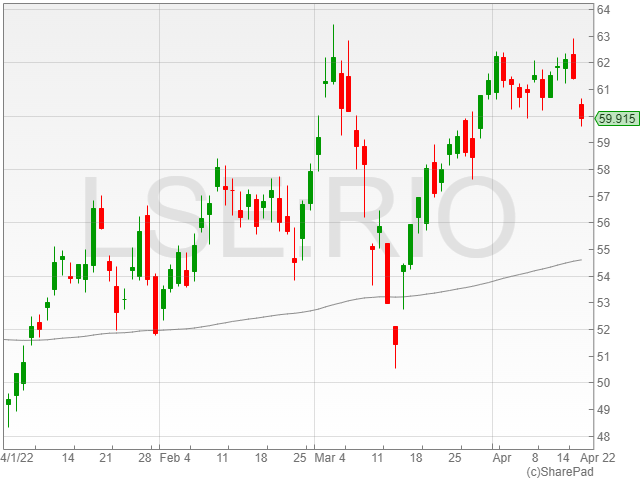Rio Tinto shares were down 2.7% to 118.3p in early morning trading on Wednesday after the mining giant reported a “challenging” first quarter in 2022.
The company said that it produced 71.7 million tonnes of iron ore from its Pilbara operations, noting a 6% drop compared to the first quarter of 2021, along with an 8% slide in Pilbara shipments to 71.5 tonnes.
Rio Tino assured investors that it expected increased production volumes and improved product mix in the second half, as a result of the Robe Valley wet plant commissioning and its ramp up of Gudaj-Darri.
“Production in the first quarter was challenging as expected, re-emphasising a need to lift our operational performance,” said Rio Tinto CEO Jakob Stausholm.
“We launched seven more deployments of the Rio Tinto Safe Production System, building on the achievements from the previous rollouts.”
“As we ramp up Gudai-Darri, our iron ore business will have greater production capacity and be better placed to produce additional tonnes of Pilbara Blend in the second half.”

The group’s current full year ship guidance reportedly remains unchanged.
The mining firm’s 13.6 tonnes on Bauxite production were in line with the first quarter of last year’s production, and its 0.7 million tonnes of aluminium production was 8% lower than the same period in 2021, due to reduced capacity at its Kitimat smelter in British Columbia following a strike which kicked off in July 2021.
Production is expected to gradually restart at Kitimat from June until the end of this year, with Rio Tinto’s other smelters maintaining a stable performance despite rising cases of Covid-19 among its staff.
The group enjoyed a 4% increase in mined copper production to 125 thousand tonnes and a 3% rise in pellets and concrete production at Iron Ore Company of Canada.
However, the firm also saw a 2% drop in titanium dioxide slag production at 273 thousand tonnes as a result of equipment reliability complications at Rio Tinto Fer et Titane in Canada.
Rio Tinto reported that its Oyu Tolgoi project had seen some welcome progress, highlighting the agreement struck with Turquoise Hill Resources and the Mongolian Government to move the project forward after an uphill battle to kickstart production in the region.
“We made notable progress during the quarter with the commencement of underground mining at Oyu Tolgoi following a comprehensive agreement reached with the Government of Mongolia,” said Stausholm.
The company confirmed that the first sustainable production from the mine could be expected in the first half of 2023.
The firm also noted its non-binding proposal with the Turquoise Hill Board to acquire the 49% of issued and outstanding shares which Rio Tinto does not currently own for a proposed price of $34 per share.
The proposal values Turquoise Hill minority shareholdings at a reported $2.7 billion.
